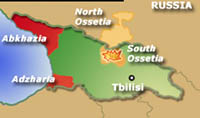South Ossetia votes for independence and freedom
Georgia's province of South Ossetia was set Monday to declare overwhelming backing for its independence drive in a plebiscite that has provoked a sharp split between Russia and the West, which unlike Moscow regards it as illegitimate.

Residents of the Tskhinvali - South Ossetia's sleepy regional center - launched celebrations after voting ended Sunday even before the official results.
South Ossetian separatists, who broke from central government control in the early 1990s in a bloody conflict in the poor Caucasus Mountain nation, are seeking eventually to join neighboring Russia. Georgia alleges that Moscow aims to annex the province, along with another breakaway region, Abkhazia.
Russia, which is locked in a bitter diplomatic dispute with Western-leaning Georgia, has rejected the accusations. Moscow, however, has insisted on ethnic groups' right to self-determination and signaled that the fate of the U.N.- administered Kosovo province, where many seek independence from Serbia, could serve as a potential precedent for South Ossetia.
Russia's pro-Kremlin youth group Nashi (Ours), which conducted an exit poll for the independence vote and parallel elections for the regional leader, said that 99 percent of voters had backed independence and 98 percent voted for the region's president, Eduard Kokoity.
Jubilant young men drove around waving the province's yellow-red-and-white flags and a crowd massed in front of a stage for performances of folk dancing by men dressed in traditional white and black costumes and women wearing red and purple dresses.
"Of course I voted for independence - independence and freedom. I want what every normal person wants," said Zoya Chugmazova, a 64-year-old school teacher.
The war between separatists and Georgian forces in this former Soviet republic in 1991-1992 killed more than 1,000 people, displaced tens of thousands and resulted in South Ossetia's de facto independence.
Some 55,000 people were eligible to cast ballots for Sunday's referendum - the second such vote since 1992. No country recognized that vote, and the United States and Europe said they would not recognize this one either.
Election officials said that nearly 95 percent of voters had cast ballots - well over the 50 percent plus one vote required to make the vote legitimate.
The referendum - in which voters were asked whether they supported independence and seeking international recognition - was expected to receive overwhelming approval, since ethnic Ossetians make up the majority of the province's population. About 14,000 ethnic Georgians also live in South Ossetia; many others fled during the war.
Georgian villages in the region were also holding an alternative plebiscite and an alternative election for the regional leader, the AP reports.
Georgian President Mikhail Saakashvili, who came to power after the 2003 popular uprising and has cultivated strong ties with the United States, has vowed to bring South Ossetia and another Abkhazia to heel.
Georgia's government is not recognizing the separatist vote, which is expected to further inflame tensions in the volatile region.
Subscribe to Pravda.Ru Telegram channel, Facebook, RSS!


